Pandemic Effects On Hardwood Flooring
Linda McDonald • February 24, 2021
Working with COVID issues in the hardwood floor industry.
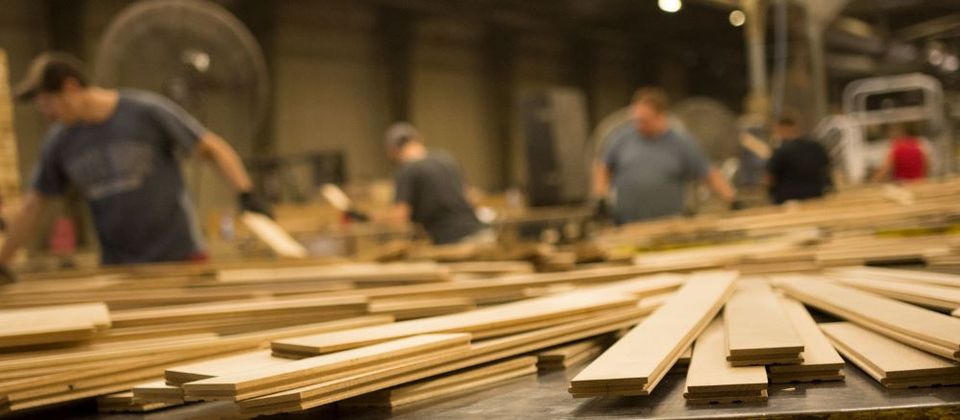
Temple Johnson Floor Company has been providing high quality hardwood flooring and professional workmanship for almost a hundred years. The variety of wood samples in their showroom seems endless, from the practical to the exotic.
Owner Bryan Jones is grateful that his company has remained busy and productive during this pandemic, when nearly all businesses have struggled in one way or another.
After almost a year of dealing with supply and demand in our personal lives, whether it’s emptier shelves at grocery stores, or slower shipping times due to a marked increase in online shopping, that slowdown has hit many other industries as well, including the hardwood floor business.
“Temple Johnson’s long-term relationships with our suppliers still allow us to negotiate the best possible prices for our clients,” Jones says. “But now those issues also include the availability of the wood products.”
Ironically, the higher the standards of the product, the more problems can develop in the steps along the way to a finished, beautiful hardwood floor. Due to Covid-19, worldwide increases in unemployment mean slowdowns in production.
Part of Temple Johnson’s mission to offer the highest quality in wood safety, means they support and follow the strict guidelines of the Lacey Act. This legislation originated in 1900, in order to ban trafficking in illegal wildlife. Then, in 2008, the Act was amended to include plants and plant products.
This was landmark legislation, the first ban in the world on trade in illegally sourced wood products. It protects against the wholesale deforestation of woods here and in other countries, ensuring a safe, legal supply to the United States. The Lacey Act also requires the forest industry to declare the scientific name, value, quantity, and country of harvest origin for the product.
Lacey Act violators can face criminal and civil sanctions. Due to these multiple issues, wood processing companies, such as Weyerhaeuser, have reduced their operating capacity by 20% for lumber and around 25% for engineered wood products.
Bryan Jones, like many in the flooring business, is not only closely watching the wood industry, but also the world-wide transportation sector, which has been hit equally hard. Covid-19’s impact on shipping has been far-reaching. Transporters often have to deal with skeleton workforces to ensure freight can continue to move. At the same time, pent-up consumer demand has boosted freight rates.
Temple Johnson has to juggle both the availability and the transportation of the desired woods of its clients. No easy task. “Now,” Bryan Jones explains, “once the client accepts our bid on their project, I tell them that I’ll still have to confirm the availability of the wood floor product they chose.”
The pandemic’s impact on the global supply chain of the forestry industry has been significant. However, as countries have lifted lockdown restrictions to reopen the economy, suppliers have begun resuming operations. It may take some time, however, for companies to get back up to speed. They are still operating with a limited workforce and must first focus on back orders or undelivered orders.
As it has for decades, Temple Johnson Floor remains committed to care for their many loyal clients as an extended family. Even if it requires a little more patience in these shifting times, they will continue to maintain and deliver the highest standards in hardwood flooring.
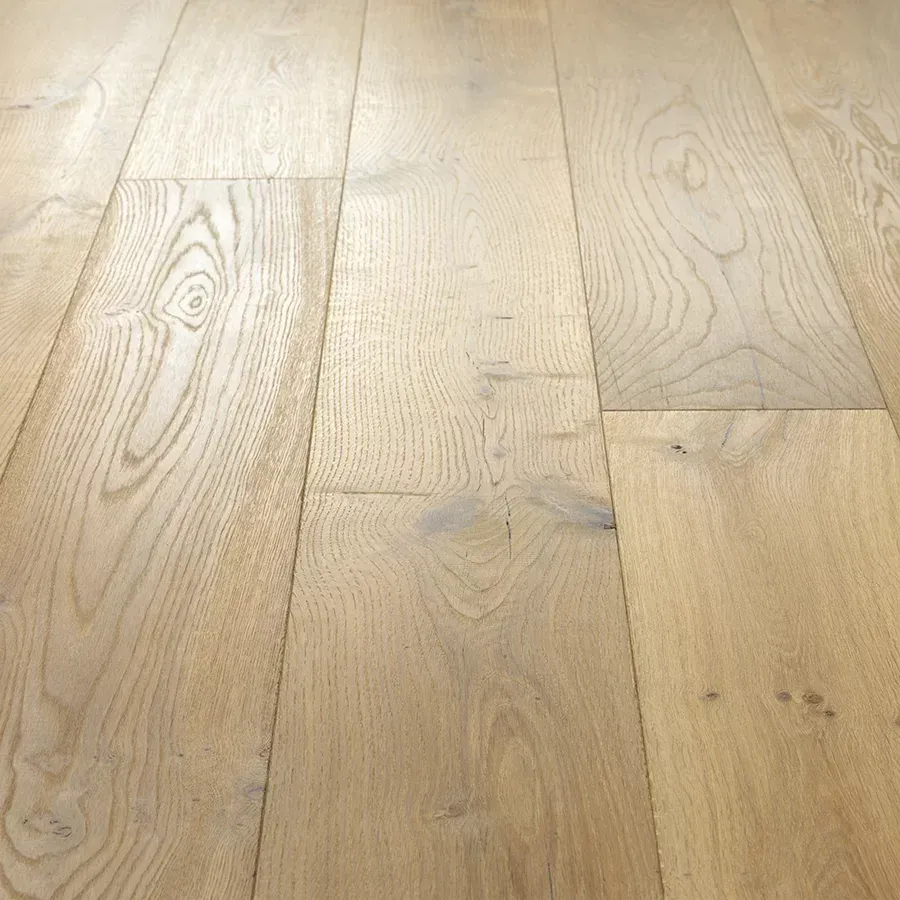
Engineered wood flooring is quickly becoming a top pick for homeowners who want the elegance of hardwood with the added benefit of durability. Made with multiple layers of wood, including a hardwood veneer on top and stable plywood underneath, this type of flooring is built to last through changing seasons and daily wear and tear. If you’re looking for a flooring option that blends beauty with practical performance, engineered wood is a game-changer. It brings the timeless look of traditional hardwood without many of its downsides. The Advantages of Engineered Hardwood Flooring: There are many reasons why Oklahoma City homeowners are choosing this versatile flooring option: • Climate Compatibility: Oklahoma’s seasonal changes bring humidity and dryness. Engineered wood handles moisture fluctuations better than solid hardwood, reducing the risk of warping or gapping. • Design Flexibility: It comes in a wide range of wood species, finishes, plank sizes, and textures—perfect for both modern and rustic interiors. • Ease of Installation: With options for glue-down, nail-down, or floating installation, it works well in a variety of spaces and over different subfloors. • Sustainability: Engineered wood uses less hardwood overall and often incorporates renewable resources in its layered construction. • Low Maintenance: Simple sweeping and occasional damp mopping are enough to keep it looking great. Best areas to Use Engineered Wood Flooring: One of the greatest benefits of engineered wood flooring is its adaptability. Engineered planks can go just about anywhere. Popular installation areas include: • Living rooms • Bedrooms • Dining rooms • Finished basements • Entryways • Kitchens (with proper sealing) Its stability makes it especially suitable for rooms that experience temperature or humidity shifts throughout the year. Engineered Wood Flooring in Oklahoma Homes: When remodeling or building, Temple Johnson Floor Company is a reliable choice that offers long-term value. It provides the aesthetic warmth of hardwood and the structural benefits of modern engineering. Many families love how it brings coziness into a space while holding up to kids, pets, and heavy foot traffic. Because of its layered construction, it also works well over radiant heating systems and concrete slabs, where solid hardwood may not be an option. Maintenance Tips for Long-Lasting Floors: To keep your engineered floors in top condition: • Place mats at entrances to catch dirt • Use furniture pads to avoid scratches • Clean spills promptly with a damp (not wet) cloth • Avoid steam cleaning or harsh chemical cleaners Following these steps helps preserve the finish and extends the life of your flooring. Ready to Explore Engineered Wood Flooring?: Engineered wood flooring offers the perfect balance of style, comfort, and performance. Whether you’re renovating a single room or planning a whole-home update, this flooring delivers long-term beauty and value. To get expert guidance and high-quality options, call Temple Johnson Flooring at (405) 842-0112 or contact us online https://www.templejohnsonfloorco.com/flooring-quote for your personalized flooring quote.
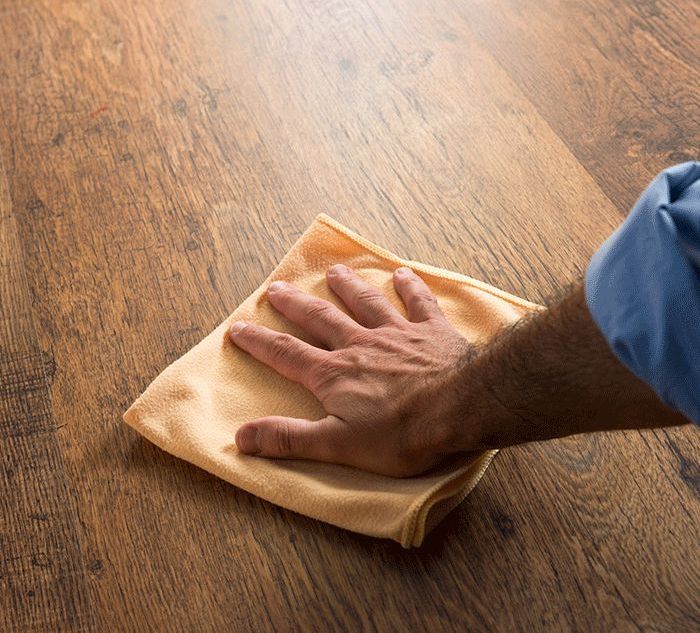
Spring is here! We understand that natural urge to wash away the previous year and start fresh by cleaning your home from the ceiling all the way down to that gorgeous hardwood floor, so we've come prepared to help! Here is the general cleaning process that we recommend to all of our hardwood flooring customers (that don’t have a wax finish on top, that is*), which should help alleviate any concern about what is and isn’t safe to clean your wood flooring with. Fortunately, the routine is quite simple! We recommend cleaning your floors bi-weekly, and as needed to accommodate for unforeseen daily messes and spills, with a dust mop or microfiber pad, and a cleaner such as Bona brand Wood Floor Cleaner. Be mindful of getting just the bottle that reads “Wood Floor Cleaner” or “Professional Wood Floor Cleaner”, and NEVER purchase any product that states that it “Polishes, Shines, and/or Restores in 1 Coat”. BONA’s wood floor cleaner is non-toxic, and unlike other wood floor cleaners it doesn’t leave behind streaks or residue if applied properly. Beyond regular weekly cleaning, feel free to use your wood floor cleaner to clean up after a spill or on tougher stains and residue build-up. STEP #1: Sweep and/or dust mop with a soft-bristled broom or pad. (The specific product pictured below is just an example, anything similar that doesn't have any abrasive elements will work perfectly fine!)

Worried about your family's furriest member scratching up your wood flooring? Don't fret! Beyond the fact that all of us at Temple Johnson simply love dogs & cats, we also extend that passion to the wood flooring that they and the rest of your family live on. Although there isn’t any one specific way to curb the scratching that your furry friends can and will inevitably inflict upon your wood flooring, we’ve provided some tips and small strategies that can actually help keep your floor looking nice!

This is a wonderful write-up on 12 different common household situations that can very well lead to the degradation and destruction of your home's hardwood flooring, and the article was written originally by Mark Melendres of Home Decor Bliss, and the link to the article itself can be found at the bottom of this page!

A beautifully stained hardwood floor grabs our senses in the same way an extraordinary painting does. The artist’s subject, color choices and perspective pull us in for a closer examination. When studying handsome hardwood floor designs, our eyes are entertained the same way. We are fascinated by the way the light reflects different shades and even a sense of movement in the wood grain. The appeal of the room is enriched not only by the chosen hue of the stain but also the particular species of the wood flooring. All the customer’s personal preferences act together to form the impression they want the floor to make. Just as a painter juggles the elements of a canvas—the subject, size, tone, and effect—stain color choices start with the aesthetics of the owner/creator. Plenty of us “know what we like” and are ready to jump in on our own. And why not? Examples of wood floors are plentiful for us to check out. Websites like Pinterest, or hardwood flooring company’s sites offer inspiring examples that may be just what you are looking for. However, most people would rather have an experienced studio artist paint their portrait. Why not use a hardwood floor specialist as “a guide by your side” through the entire process? Temple Johnson Flooring, a century-old, family-owned business that has treated clients like family for decades, is the perfect place to find this support. Owners Bryan Jones and Matt Sparks are hardwood floor specialists who represent decades of experience. They have the talent to listen to what you want and make it happen.

The real world demands a lot of people’s time today. We’re asked to fill out endless questionnaires, for instance, before every doctor’s appointment. Ask yourself: how long did you have to sit on hold to speak to a real person at a corporation? It sometimes seems unreal, the red tape people are subjected to today. What may be surprising, and also real, is that a huge project such as buying engineered hardwood flooring today is simpler and more cost effective than ever. It’s amazing how many expenses have been removed from the process. In most cases it costs less than traditional hardwood flooring, but is also easier to install, so complex scheduling over several weeks has become a headache of the past. One common misconception about engineered flooring is that when people hear the term, they assume it is a man-made veneer, not real wood. At Temple Johnson Floor, after clients see the engineered showroom samples, owners Bryan Jones and Matt Sparks are always asked the same question. “Is that real wood?” And their answer is always, “It absolutely is.” Engineers and flooring specialists have come up with an ingenious new way to craft real wood floors. It is here and growing larger every day. For reference, traditional wood floors are solid hardwood planks installed over plywood decking, then sanded and stained on the job site. Traditional floors require more procedures that all have to be coordinated with the client and other workers on the premises (painters, electricians, for example). Engineered floors are constructed using several layers of real wood, which is uniquely configured. On top sits the real hardwood veneer, firmly supported by ¼” layers of crisscrossed different species of wood. It is available finished or unfinished.

It is with a heavy heart that we announce the passing of someone that was integral to Temple Johnson Floor Company, Jerry Sparks. As a family owned-and-operated company, this was a heavy blow. We would like to take this opportunity to reflect on the innumerable amount of people that he touched the lives of through his work here at Temple Johnson, and the flooring industry in general, customer or otherwise. While his servant’s heart led Jerry’s life, he also led by example with his hands, accomplishing a profound amount as a small business owner and as an inspiration to others through his hard work. Upon purchasing the company in 1978 from Pauline Johnson & Jimmy Martin, Jerry owned and operated Temple Johnson Flooring Company from 1979 to 1992. He then sold the business to his brother-in-law and promptly started his own home-building business, Chance Matthew Homes, named after his sons.

Hardwood flooring is enjoying a popular resurgence in Herringbone, a familiar and ancient pattern. The design gets its name from the delicate skeletal structure of herring. The fish’s bones slant in a V-shape pattern as they spread away from the spine. This is a fantastic example of the general structure we're talking about here:
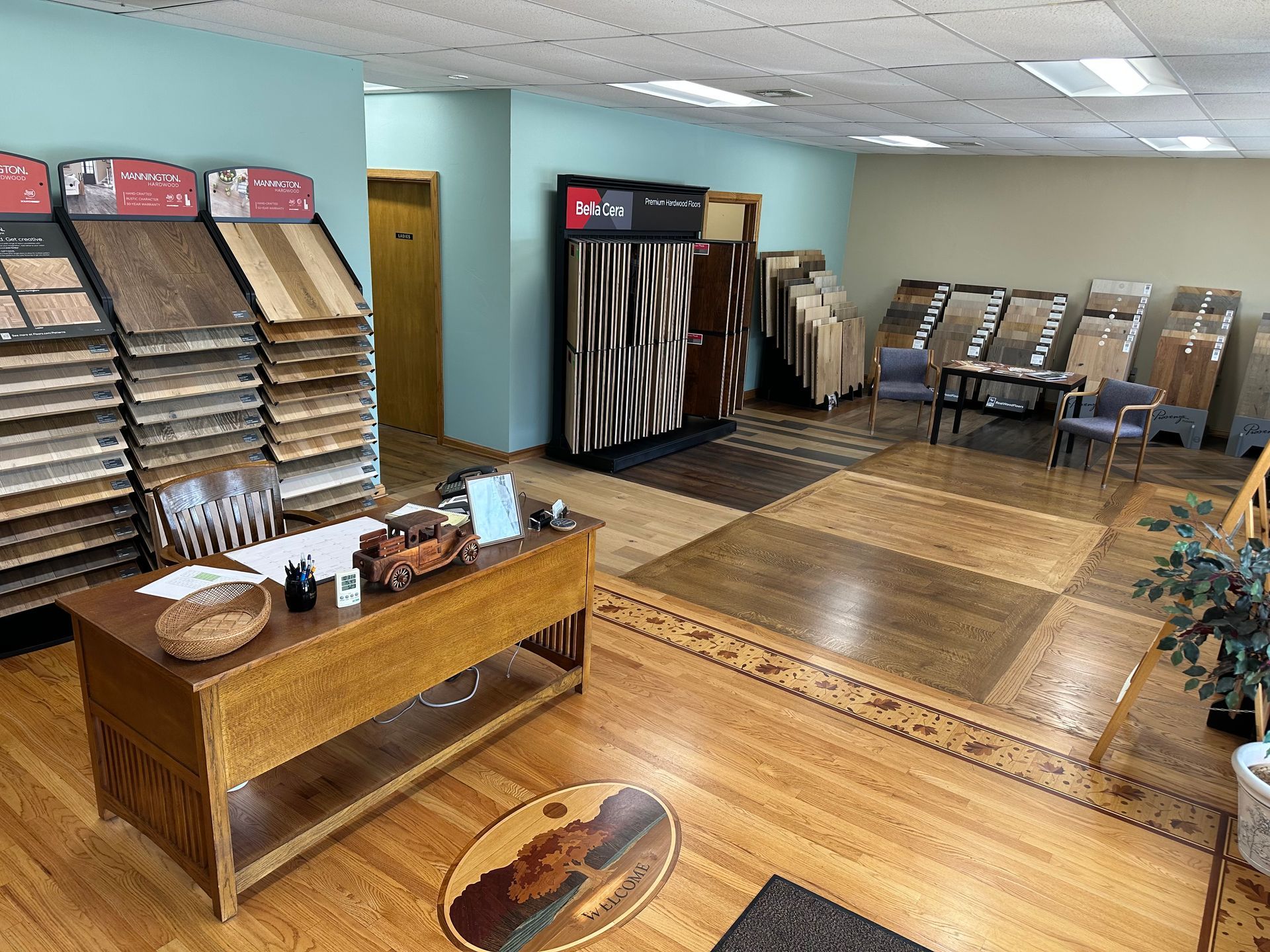
Are you looking to upgrade the aesthetics of your home while adding a touch of elegance and warmth? Look no further than Temple Johnson Flooring here in Oklahoma City! We are thrilled to present our exceptional collection of hardwood flooring options to help you elevate the beauty of your living spaces to new heights. With our extensive range of high-quality hardwood materials and professional installation services, we are committed to helping you achieve the home of your dreams. Let's dive into the captivating world of hardwood flooring and explore why it is the ideal choice for homeowners seeking sophistication and durability. There's a reason why hardwood flooring has remained a timeless classic since the advent of human history. Its natural beauty and warm tones bring a sense of vibrancy and luxury to any room. We accomplish this with the help of a wide variety of wood species, grains, and finishes offered here at Temple Johnson, which in turn affords you the ability to choose a style that perfectly complements your interior design preferences and goals. From the rich, traditional hues of oak to the exotic allure of Brazilian cherry, all of our hardwood flooring options will create an ambiance that reflects your unique personality and tastes, and ultimately enhance the overall aesthetic of your home. Wood flooring has brawn to back up all that beauty, as well! Investing in hardwood flooring means investing in longevity. With proper care and maintenance, hardwood floors can withstand the test of time, maintaining their beauty and structural integrity for decades on end. Our hand-selected wood flooring brands that we've partnered with are crafted using the finest materials and expert craftsmanship, ensuring durability and longevity. Whether you have a busy household with kids and pets or you simply want flooring that can withstand daily wear and tear, our hardwood floors are designed to stand up to the challenges of essentially any lifestyle. With all of that in mind, it becomes quite clear that one of the greatest advantages of hardwood flooring is its versatility. It effortlessly complements a wide range of interior styles, from traditional to modern and everything in between. The rich undertones and different tones brought out by simply changing the wood floor stain can help it remain adaptable to your interior design changes over a lifetime. Because of this, here at Temple Johnson we offer an extensive selection of finishes, stains, and plank sizes to cater to your individuality and creative preferences for your home. Whether you desire a rustic farmhouse look, a sleek and modern contemporary vibe, or a timeless traditional feel, our hardwood flooring options can be customized to match your vision. Keeping your hardwood floors looking pristine is surprisingly simple! Regular sweeping and occasional gentle mopping with Bona Hardwood Floor Cleaner is all it really takes to maintain their natural luster. A recent EPA study also found that hardwood floors greatly reduce the accumulation of toxins. Unlike carpet that trap dust, allergens, and pet dander, hardwood floors are hypoallergenic and contribute to improved indoor air quality, and in a state like ours with allergens abound, this increased air quality is truly a life-changer for many of us. With hardwood flooring from Temple Johnson Flooring, you can enjoy a cleaner and healthier living environment, perfect for individuals with allergies or respiratory sensitivities.
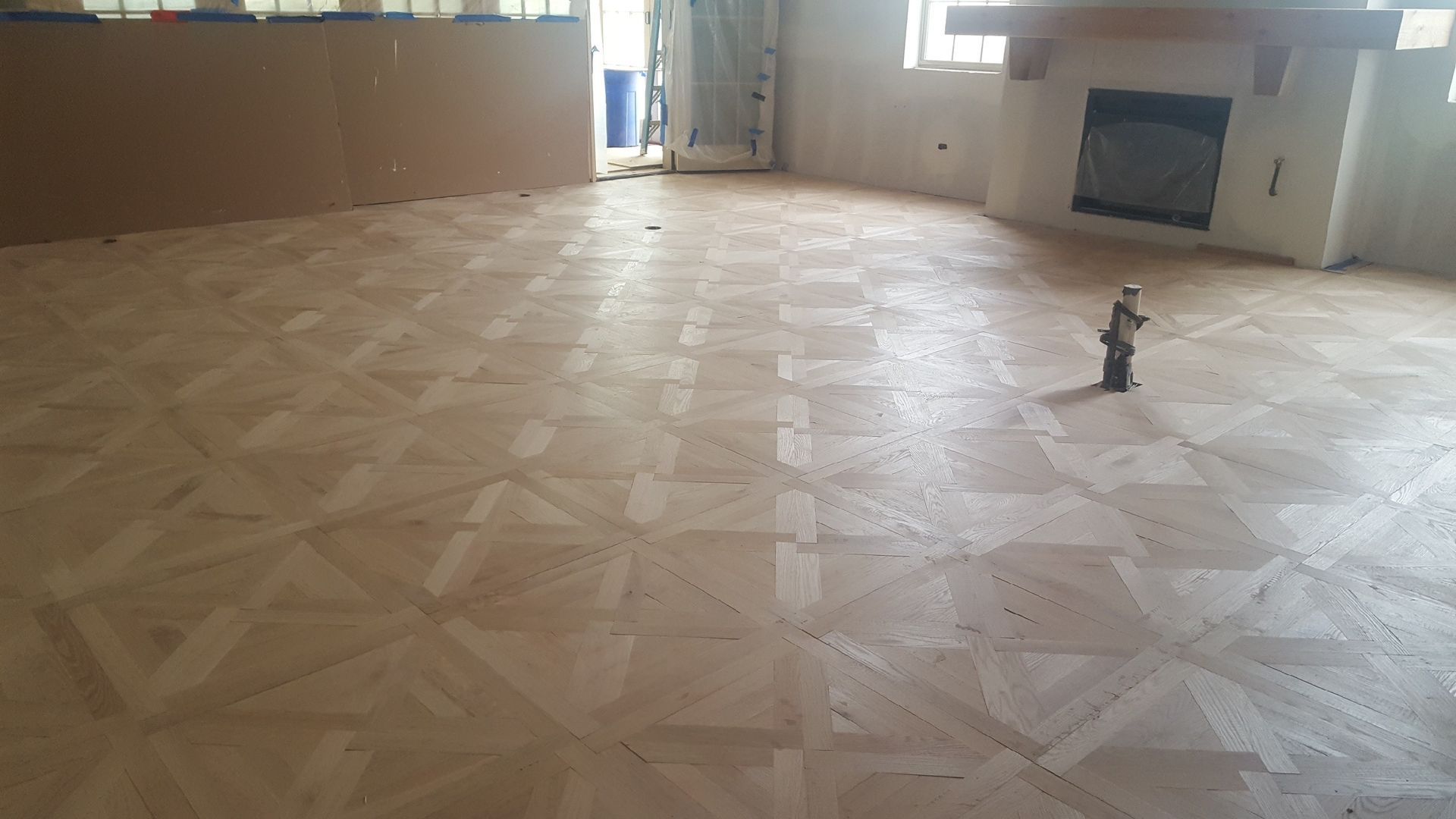
French Parquet wood flooring was originally designed to replace historic estates’ stone and marble floors. Those rigid surfaces eventually wreaked havoc on the mansions’ enormous wood frameworks. Parquet wooden floors, on the other hand, built using 3’ x 3’ square units, proved far more forgiving than the historic rock-hard surfacing. Not only did French Florentine Parquet prove architecturally functional, but also became universally famous for its eye-catching designs. Recently, Temple Johnson Floor was approached about a custom wood floor design. It called for scaling down a French parquet’s standard 3’ x 3’ squares to only 2’ x 2’. Clients could never order such a one-of-a-kind design through today’s big box, wholesale flooring stores, who depend on volume sales. It would be difficult to order them from anywhere, really, even though the clients had hoped to begin as soon as possible.


